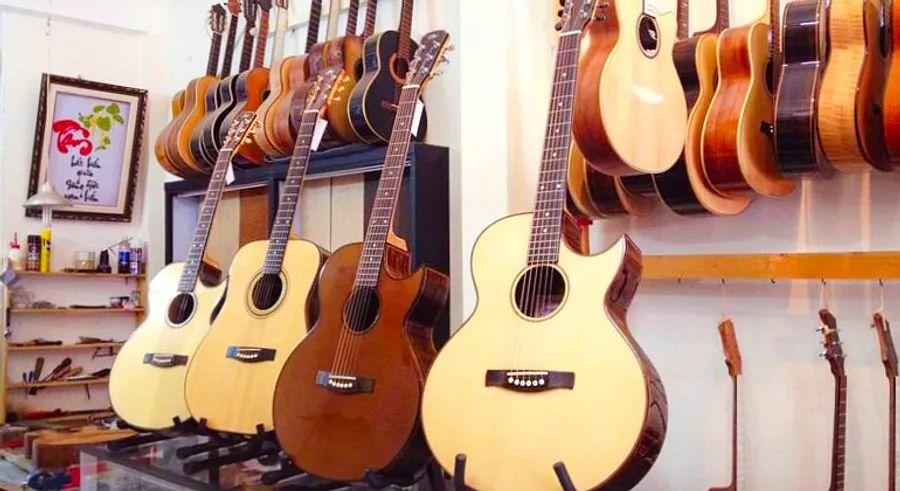The soulful melodies of Ho Chi Minh City's legendary 'Guitar Street'

Ton That Anh seems unsettled… and it's not just because I'm struggling to decide which of his hand-crafted acoustic guitars to purchase.
As one of the longest-standing artisans on Nguyen Thien Thuat in Ho Chi Minh City, affectionately called 'Guitar Street' by generations of southern Vietnamese musicians, Anh – co-owner of Duy Ngoc Guitars with his siblings – has witnessed numerous shifts over the years.
Clearly, some of these changes don't sit well with him.
“Quality has declined,” he murmurs darkly, gently holding the neck of the exquisite blonde wood Dreadnought copy I've been eyeing, sitting low on one of the small plastic stools that are so common in Southeast Asia.
“Too many people are making too many guitars, and the quality just isn't what it used to be,” he remarks.

Anh and his brothers source their guitar wood from the renowned forests of Europe and North America.
“Tropical woods, including Vietnamese varieties, aren't as durable,” he explains. “They crack far too easily.”
It’s easy to see why Anh and other veteran luthiers on the street are cautious about subpar craftsmanship.
Like all artisans, the reputation of the guitar makers here is everything. They’ve carefully built their names ever since Nguyen Thien Thuat became a guitar hub following Vietnam’s reunification in 1975 and the city’s renaming from Saigon to Ho Chi Minh City.
For decades, their skills as guitar makers have earned them deep respect and appreciation from Vietnam’s vast community of musicians. As the country reopened to the world after years of isolation, an influx of expatriates and savvy foreign visitors began to bring serious business to skilled craftspeople like the team at Duy.
It’s clear that the customer base has shifted over time.
Snapshots of smiling Western rock musicians, posing with Anh and his guitars and mandolins, cover the wall directly behind the craftsman.
‘Business is thriving’

“They come from all over the world,” he says.
“From Australia, America, the UK. I even had an order from Chile recently. In the West, a custom-made guitar can cost thousands of dollars. Here, they’re much more affordable, and the quality is still top-notch.”
At Binh Guitar down the street, owner Nguyen Van Binh seems delighted with the growing recognition of Nguyen Thien Thuat. As soon as I step inside, he eagerly hands me a photocopied article from an American guitar magazine. “Business is booming thanks to all the positive press,” he says.
The fact that Vietnam is gaining international acclaim for the quality of its acoustic guitars may surprise some, but musicians in the country have had a deep connection to stringed instruments for centuries.
Instruments like the dan nguyet (a two-stringed moon lute) and the dan ghi-ta (an acoustic guitar with a scalloped fretboard) are central to Vietnam’s folk music traditions.
Meanwhile, the contemporary music scene is starting to gain momentum after years of stagnation. Although commercial pop is the dominant genre among young Vietnamese, a growing number of hip guitar players are following in the footsteps of Trinh Cong Son – the iconic figure known as 'Vietnam's Bob Dylan' – and stepping onto the stage.
The city's music scene has evolved significantly since the post-reunification era when the romantic, sensual nhac vang (yellow music) popular in Saigon was banned. For years, the militaristic nhac do (red music) was the only style allowed, and the city's rich songwriting tradition was nearly lost.
A neighborhood out of harmony

Such restrictions have long been removed, and a growing number of venues like the Old Compass Café, Yoko, and Indika now serve as platforms for local talent, including solo artists like Tofu, David Tran, and Thanh Luke, as well as bands like Ca Hoi Hoang, Gac Mai, and Bet.
These developments should be promising for the traders on Guitar Street, but conversations with the shop owners reveal that not everything is as in tune as the music from their instruments.
Over 30 guitar shops line the 500-meter stretch of Nguyen Thien Thuat, offering everything from bespoke acoustic guitars that have earned the street its fame to uniquely shaped electric guitars, mandolins, and traditional Vietnamese string instruments.
However, as with any market, more options don’t always mean better quality on Guitar Street. This is a major concern for those who have spent the last four decades carefully crafting and protecting their reputations.
According to Anh, some of the newer competitors are using inferior wood and rushing through the production process just to fill the shelves quickly. The escalating rent in this fast-growing Asian city is also a growing issue.
“Business is generally good,” he says. “But rents are climbing, and some are cutting corners to stay afloat. We used to work together and play music in the evenings. That’s happening less now—and it's unfortunate.”

1

2
3

4

5
Evaluation :
5/5